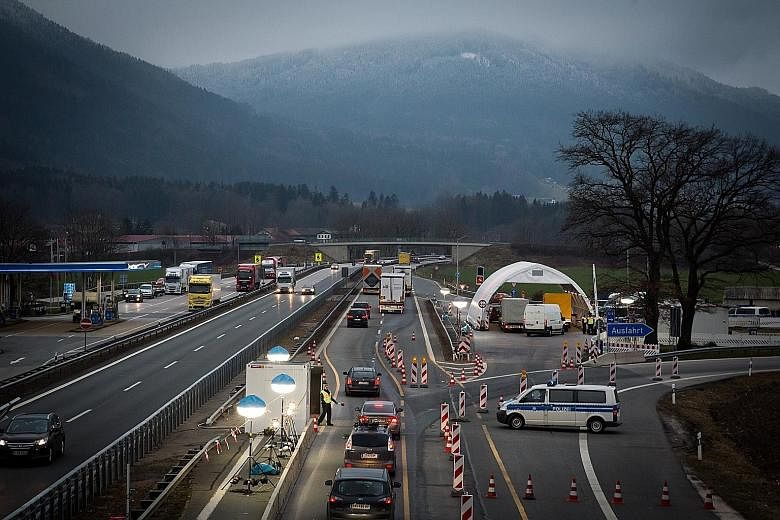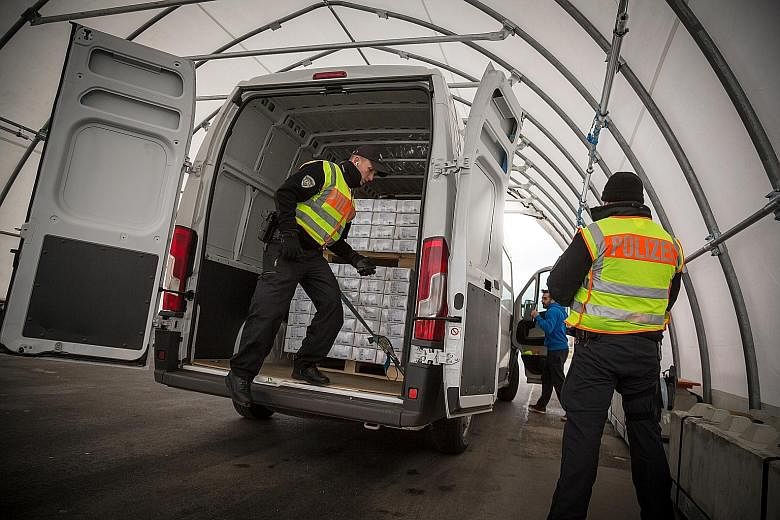FREILASSING (Germany) • Traffic along one of Europe's busiest highways, which used to flow unimpeded, now often backs up for kilometres at a newly installed checkpoint, where a phalanx of German police officers screens trucks and cars for hidden migrants. Many companies in Germany must wait days longer for deliveries of food, machine parts and other goods.
"It's really bad," said Mr Karl Pichler, owner of a gardening centre in Freilassing, whose sales of rose bushes and other plants have withered as long-time customers from Austria stop coming.
"Most business in town has dropped tremendously," added Mr Pichler, who worries he may have to lay off employees soon.
But given the influx of migrants to Germany, he acknowledged that the border controls are necessary. "It's the right thing to do, even if we take a hit," he said. "We need to get this migrant situation under control."
But as the European Union grapples with the biggest migrant crisis since World War II, the revival of checkpoints along some of the region's most important transport routes is crimping commerce and threatening to cost billions of euros in lost business just as the continent is recovering from a six-year economic slump.
With no end to the migrant crisis in sight, some national governments are pushing to expand the number of checkpoints.
The shift is not only straining political and social cohesion but also threatening the EU's post-war principle of peace through prosperity.
"One after another, we close the borders, and once they are all closed, we will see that the economic cost is huge," Mr Jean-Claude Juncker, president of the European Commission, warned the European Parliament in January.
Of the 28 countries in the EU, 22 have passport-free arrangements, with Britain one of the notable exceptions. But the lines are quickly being redrawn across Europe.
Since last year, Austria, Denmark, France, Norway and Sweden have joined Germany in imposing and extending temporary border checks.
Belgium last week temporarily shut its border with France. Fences have gone up on various other borders, including borders in Croatia, Hungary and Serbia, and along the Austrian- Slovenian frontier.
For Mr Doruk Tumer, a truck driver for a Turkish delivery company, the trip to Germany has become a roadblock-riddled odyssey. Previously, his route from Turkey and Greece through the west Balkans - a path similar to that used by nearly one million migrants last year - took about five days. Now, Mr Tumer said, it can last up to 12 days, while the former two-hour drive through Austria sometimes takes more than a day.
"Time is money," he said, noting that costs have risen 30 per cent because of longer delivery times, higher refrigeration charges for perishable goods and the occasional use of a second driver to overcome delays.
Officials are seeking ways to secure Europe's outer boundaries so that countries within the bloc do not have to seal theirs under the Schengen agreement. European officials are pressing Greece, which constitutes Europe's southern frontier, to sharply strengthen its refugee controls by mid-May. Should Greece fail to comply, border controls could be imposed through 2018 or beyond.
Meanwhile, at the single-line checkpoint at the Freilassing border in Germany, police waved through trucks that bore inspection stickers from Austria, but stopped vehicles with "people who look Arabic", said Mr Rainer Scharf, a police spokesman.
At the moment, the temporary border facility looks permanent, with offices and computer terminals, and a soaring white tent sheltering dozens of police officers.
NEW YORK TIMES


